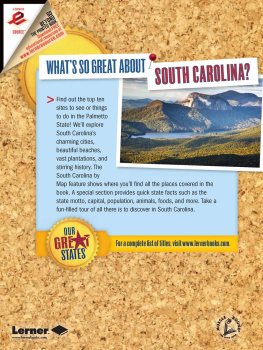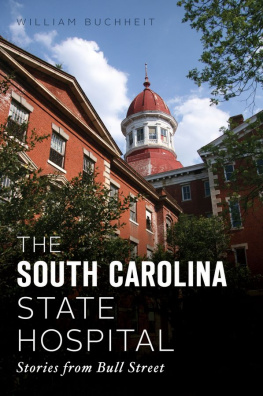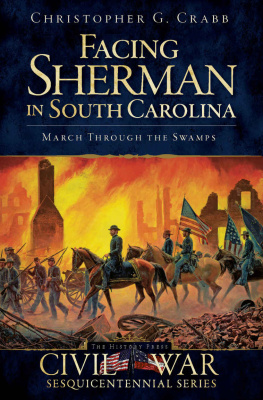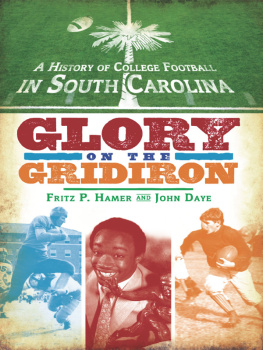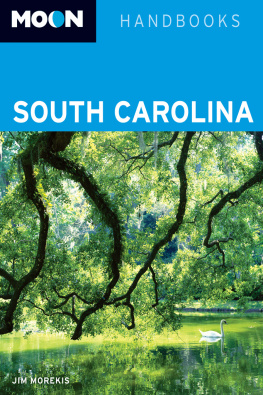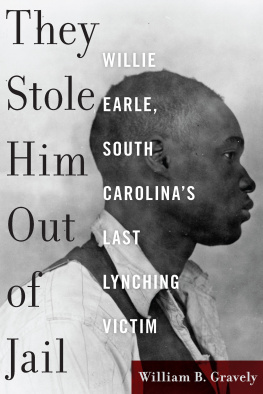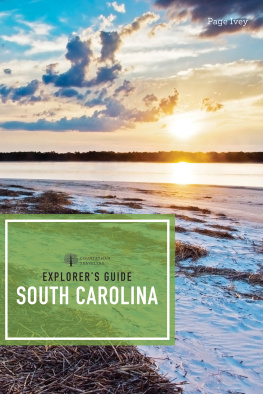2018 University of South Carolina
Published by the University of South Carolina Press
Columbia, South Carolina 29208
www.sc.edu/uscpress
27 26 25 24 23 22 21 20 19 18
10 9 8 7 6 5 4 3 2 1
Library of Congress Cataloging-in-Publication Data
can be found at http://catalog.loc.gov/
ISBN 978-1-61117-851-7 (cloth)
ISBN 978-1-61117-852-4 (ebook)
Front cover image courtesy of the Historical Collection,
South Carolina State University
Acknowledgments
H istorians do not work alone. They depend on archivists, librarians, and colleagues as they research and write about the past. That has certainly been the case with South Carolina State University. Many people have contributed their knowledge, skills, and time to the preparation of this history.
The University Archivesotherwise known as the Historical Collectionwas discovered relatively recently thanks to a tip in the late 1980s from M. Maceo Nance Jr., the former president of S.C. State. Nance recalled that there might be some college papers and records located in a small storeroom in the large Crawford-Zimmerman complex, where the college maintained a warehouse with vast supplies of everything from paper towels to cleaning products. Sure enough there in a windowless room were cardboard boxes of papers stacked haphazardly amid metal file cabinets, their drawers bulging with papers and correspondence dating back nearly a century. Some had been damaged years earlier by water when the records were kept in the basement of Wilkinson Hall. But these were the materials that became the core of the Historical Collection.
Thanks to the determined efforts of Barbara Williams Jenkins, the dean of the library, the documents were moved to the Miller F. Whittaker Library, where they joined the annual reports, college yearbooks, newspapers, and photographs that had been serving as a less-than-complete archive of the college. Today that Historical Collection represents the most important repository of information on a single African American institution in South Carolina. When Nelson C. Nix and John Potts wrote their histories of South Carolina State College years ago, they did not have access to most of these records.
Several archivists have worked diligently for more than two decades to transform those unprocessed, disorganized, raw records into a usable institutional archive. Yet it remains a work in progress. Lela Johnson Sewell, Aimee R. Berry, Ashley Till, the late Barbara Keitt, and Avery Daniels have labored hard to develop this splendid collection, and each of them has been extraordinarily helpful in making those records available for this history.
Following the retirement of Barbara Williams Jenkins, Mary L. Smalls and then Adrienne C. Webber have served as the dean of the library and information services. Too often in recent years, the Miller F. Whittaker Library has been compelled to cope with severe financial constraints. But each of the deans has recognized the importance of the Historical Collection, and they have made certain that it was not neglected.
Several other librarians at the Miller F. Whittaker Library have gone out of their way to assist in acquiring materials for this study. They are Doris Johnson Felder, Cathi Mack Cooper, Sherman Pyatt, Ruth Hodges, Beatrice McDonald, and Wanda Priester. The consortium of South Carolina college and university libraries that make up PASCAL (Partnership among South Carolina Academic Libraries) greatly facilitated the acquisition of library materials.
Archivists at other institutions have also been generous with their assistance. No one helped more over the years than Allen Stokes, the longtime director of the South Caroliniana Library at the University of South Carolina. Now retired Stokes is librarian emeritus. But historians from across the nation know him as an archivist exemplar. He has an unrivaled knowledge of South Carolina history and its resources. (And he is also strikingly well informed on major league baseball, particularly a team that plays in Cleveland.) At the Caroliniana Stokes has been ably assisted by Henry Fulmer, now the director; Beth Bilderback, the visual materials archivist; and Elizabeth West, who presides over the archives related to the University of South Carolina; and Herb Hartsook, the director of the Ernest Hollings Political Collection at the Thomas Cooper Library.
In recent years the South Carolina Department of Archives and History has suffered massive and deplorable reductions in its state appropriations. This has resulted in a loss in personnel, and that fine facility is now open to the public for far fewer hours each week than it was in the 1970s and 1980s. But the services provided by people like Rodger Stroup, W. Eric Emerson, Charles Lesser, J. Tracy Power, Alexia Helsley, and Steven R. Tuttle have remained at a consistently high level. They have been exceedingly cooperative in making state documents and governors papers involving S.C. State available.
Many years ago the Rockefeller Archive Center made a grant available to travel to North Tarrytown, New York, to examine the General Education Board records that pertained to South Carolina State College. Darwin Stapleton, Ken Rose, and the archive staff helped to navigate those important materials.
There have been many other people willing and eager to share information about South Carolina State. Not only has Barbara Williams Jenkins been a fine librarian and administrator; she also possesses an incredible knowledge of the African American community in South Carolina. It is only a slight exaggeration to insist that Barbara seems to have known every person who attended or worked at S.C. State in the twentieth century. Deborah Blackmon helped track down elusive information and expedite the publication of this history. Richard Reid has an abundant store of information based on his research on S.C. State presidents as well as his extensive excursions into the history of African Americans and their institutions in Orangeburg. Eugene Gene Atkinson is well acquainted with the history of Orangeburg and its many leaders and personalities. Heather J. Gilbert, the digital scholarship librarian at the College of Charleston, helped with images from the 19012 South Carolina Interstate and West Indian Exposition as did Joyce Baker of the Gibbes Museum of Art. Bill Barley readily offered access to photographs that he took at the time of the Orangeburg Massacre in 1968. Cecil J. Williams has been South Carolinas preeminent civil rights photographer, and he has been unfailingly generous in sharing photos and information on that movement.
William Bill Hamilton, the now retired sports information director, assisted with information on athletics. Mary Hill offered some key data on the participation of women in the Bulldog athletic program. Oliver Buddy Pough and Willie Jeffries readily shared some of the abundant wit and wisdom they accumulated in the years they have been associated with their alma mater.
Departmental colleagues in history and political science have been willing to offer advice and suggestionsfrequently unsolicitedon S.C. State. On more informal occasions, and with some liquid refreshments in hand, they have been known to provide some especially keen insights into the intricacies of South Carolina States history and leadership. Therefore much appreciation is extended to Willie Legette, Larry Watson, Stanley Harrold, and Millicent Brown. A sizable debt of gratitude is owed to former chairs of the Department of Social Sciences beginning in 1967 with Rubin F. Weston and continuing through Edward R. Jackson, Rickey Hill, Barbara Woods, Learie Luke, Larry Watson, and Benedict Jua.




